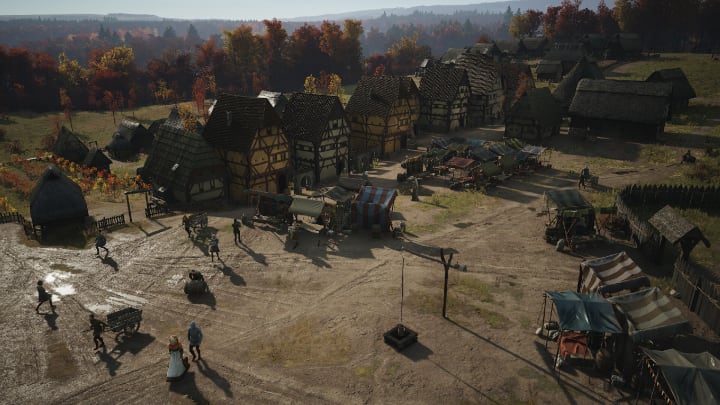Manor Lords: How to trade

Money isn’t the solution to all problems, but growing your Regional Wealth in Manor Lords should still be one of your priorities, as it opens up many more possibilities of developing your town. The primary source of Regional Wealth in Manor Lords is the export of goods to places outside of the map, so you’ll need some domestic production to support it.
You can send resources to other regions in your domain after you’ve claimed and settled new areas, which previously worked exclusively through bartering and didn't bring in any money. However, after patch 0.7.972 the ability to use Trading Posts to trade resources for Regional Wealth between your own regions has been enabled.
In this guide, we’ll break down how to trade in Manor Lords step by step so that your town can become a bustling mercantile metropolis.
How to trade in Manor Lords
In order to import and export goods and resources in Manor Lords, you’ll need to build a Trading Post that’s connected to the King’s Road – that’s the main road winding through all areas of the map, which serves as the main artery for trade.
You’ll need to assign a family to your Trading Post as well, otherwise the building won’t function properly. I’d advise you to buy a horse and permanently assign it to the Trading Post, too, as the animal’s help will be invaluable in making trading worthwhile – without a horse, your workers will have to carry trade goods by themselves, which is very inefficient. Carts drawn by horses are a lot quicker and can carry more goods at once, leading to more profitable trades.
Once that infrastructure is set up, click on your Trading Post, navigate to the “Trade” tab and look for the resource or ware you’d like to trade. Found it? Good. Click on the little horse cart next to the number and money bag icon reading “Establish Trade Route” and make sure you have enough Regional Wealth to pay for it. This will open a trade route for this particular resource, allowing you to import and export it.
To regulate trade, you simply choose the option you need – import, export, or full trade – and set a storage limit for how much of the resource or ware you want to have at your settlement. If you want to export warbows, for example, you should keep 36 of them in reserve at your town, since that’s how many you need to equip one unit of Archer Militia. So you put the number 36 as your target and choose the export option – this will lead to any surplus warbows being sold off. Like with everything else in the game, this won’t work immediately – goods need to be physically transported before the dough comes rolling in.
Due to an early balance change in the game, prices will plummet if you sell one type of good for too long, as you’re flooding the market with it. Hence, you should be prepared to open other trade routes in order to rotate your offerings and keep a steady supply of Regional Wealth coming in.
An iron industry is perfect for such a scheme, as the basic resource – iron ore – can be refined into iron bars and from there be formed into tools, sidearms, or polearms. This allows you to get your production and trade offers adjusted to new market conditions quickly.
Patch 0.7.972 enabled the option to use Trading Posts for the exchange of goods between your own settlements. This basically works the same way as external trade, though you need Trading Posts in both towns. Unlock the trade route for the resource or good you want to trade and then have one city export and the other import it. Then use the checkmark to toggle off foreign trade, forcing the towns to only trade with each other. Similar to regular trade, this will require Regional Wealth to be spent by the importing town, which will be transferred to the exporting settlement in exchange for its goods.
What do you do if you don’t have enough Regional Wealth to open a trade route? Don’t worry, it doesn’t mean you won’t be able to trade at all – some Regional Wealth can also be gained from a plundered Bandit Camp. Build up your army, defeat the brigands in battle, and loot their camp – the spoils can be invested into unlocking trade routes and buying horses for your merchants.
